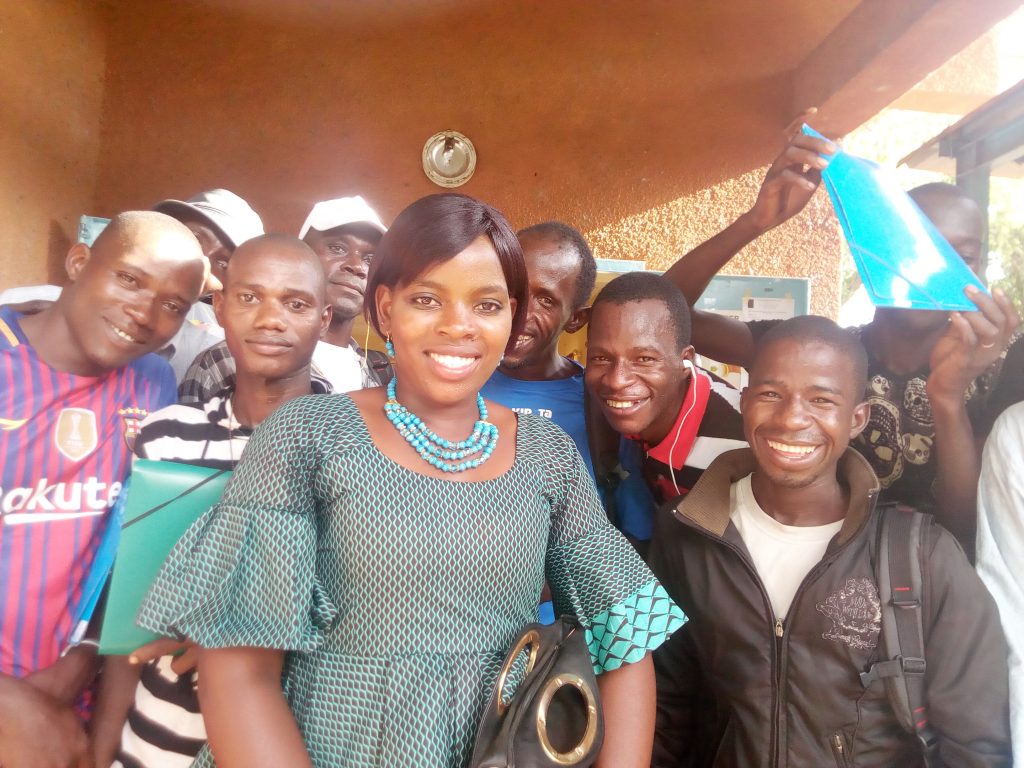In Guinea’s battle with malaria, the country’s most burdensome communicable disease, “community relays” are on the frontlines. These community health workers educate communities, test people with fever for malaria, and treat uncomplicated cases or send them to the nearest health facility. In fiscal year 2018, PMI’s StopPalu+ project trained 659 community relays.
One community relay leading the charge in her village is Mariame Dalanda Barry.
She first joined the malaria efforts in her community during a seasonal malaria chemoprevention (SMC) campaign, which is when teams come to villages to give all children under 5 a medication to try to protect them from the malaria parasite. Afterward, Mariame was approached by parents and congratulated by the women in her village for her courage and her concern for the health of her community in general, and particularly for the health of the children.
When her village asked her to become their community relay for malaria prevention, she accepted with great joy. Mariame describes her malaria journey in her own words:
One day, I met a man who came to work in our village, and I noticed that he was having problems talking with our mothers and the women in the village. I felt compelled to help him. I understood that his work had something to do with health, and they were talking about malaria. I tried to find out if all the children in the village had received their medicine by questioning the women, and we realized that many children had not been seen [by the project team]. We began to go to all the houses to check if the mothers had their campaign cards [showing that the children had received their dose of medicine].
We encountered one child, 4 years old, who was bedridden, with his 6-month pregnant mother. After talking with her, she agreed to bring her child, who had received a referral from the team, to the health center in Kounsitel.
I found the work interesting because it saves lives and fights against an illness that is well known in our village. Malaria has killed children here, our neighbors’ children. I have always remembered this: Because we lacked the means to do something, a child is dead.
After we visited the households, the team asked me to become involved in the next campaign rounds so that they could reach all the children in the village. I accepted this request and promised to take up the challenge: find and reach all the children in the village and surrounding hamlets.
I received an orientation session on the campaign’s messages and used them over the four days of the next round to educate my community and mobilize them to participate in this campaign. My actions targeted women and heads of households, and I talked to people during the evening gatherings.
On the last day of the campaign, I asked to be the person in charge of malaria efforts in my district. They told me that this was quite possible, and that the work was voluntary. Anxious to protect the children of the village, I agreed to become a community relay, to fight against malaria and to educate communities on using mosquito nets.
Today, my dream has become reality because I took up the challenge that I set for myself when I became involved in the campaign—all the children are taking their medicine because of my education and mobilization efforts. I received five days of training on malaria. I know how to recognize the signs [of malaria], how not to become sick with this illness, and how people can protect themselves. I can even test someone, so they know if they have malaria or not.
All of this today is thanks to the good work I have done since you found me in our village. I am so happy—since I took part in the campaign, I learned a lot and I really changed my behavior. I learned how important a mosquito net is for malaria prevention. I urge my entire family to use a bed net, and I go to the neighbors’ houses at night too, telling them to use their mosquito nets, reminding them, if necessary, that a child has died.
I truly thank your project. My family is happy with me, and the whole community is proud of me and they are also grateful for the project that makes me what I am. Thank you so much, and I promise you I will do everything I can to make sure that no one becomes sick with malaria, that children do not die here in front of me, and that our sisters go to the health center to get their bed nets—bed net use at 100%!
Because of the commitment of people like Mariame, the StopPalu+ project, supported by the American people, is saving lives and improving the health of people all over Guinea.

